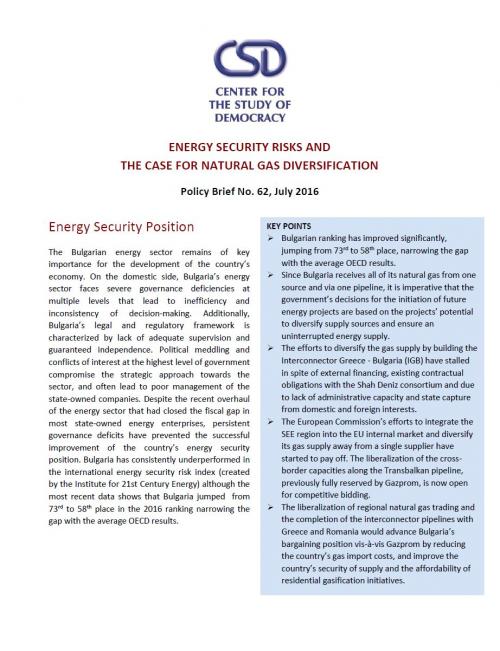CSD Policy Brief No. 62: Energy Security Risks and the Case for Natural Gas Diversification
CSD Policy Brief No. 62: Energy Security Risks and the Case for Natural Gas Diversification
Author(s): Author Not Specified
Subject(s): Politics / Political Sciences, Social Sciences, Economy
Published by: Център за изследване на демокрацията
Summary/Abstract: The policy brief analyses the energy security and governance risks. The authors underline that:
- Bulgarian ranking has improved significantly, jumping from 73rd to 58th place, narrowing the gap with the average OECD results.
- Since Bulgaria receives all of its natural gas from one source and via one pipeline, it is imperative that the government’s decisions for the initiation of future energy projects are based on the projects’ potential to diversify supply sources and ensure an uninterrupted energy supply.
- The efforts to diversify the gas supply by building the Interconnector Greece - Bulgaria (IGB) have stalled in spite of external financing, existing contractual obligations with the Shah Deniz consortium and due to lack of administrative capacity and state capture from domestic and foreign interests.
- The European Commission’s efforts to integrate the SEE region into the EU internal market and diversify its gas supply away from a single supplier have started to pay off. The liberalization of the cross-border capacities along the Transbalkan pipeline, previously fully reserved by Gazprom, is now open for competitive bidding.
- The liberalization of regional natural gas trading and the completion of the interconnector pipelines with Greece and Romania would advance Bulgaria’s bargaining position vis-à-vis Gazprom by reducing the country’s gas import costs, and improve the country’s security of supply and the affordability of residential gasification initiatives.
Series: Center for the Study of Democracy - CSD Policy Briefs
- Page Count: 5
- Publication Year: 2016
- Language: English
- Content File-PDF

